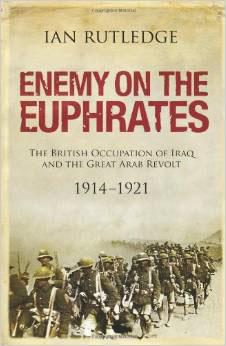You are here
‘These thankless deserts’
By Sally Bland - Jun 01,2014 - Last updated at Jun 01,2014

Enemy on the Euphrates: The British Occupation of Iraq and the Great Arab Revolt, 1914-1921
Ian Rutledge
London: Saqi Books, 2014, 471 pp
Much of “Enemy on the Euphrates” reads like a great adventure story, proving how fascinating real history can be. Some battle scenes are narrated in the present tense, heightening the excitement. Many famous and infamous players make an appearance from T. E. Lawrence to Gertrude Bell, Mark Sykes, Winston Churchill, Lord Kitchener and a host of British army commanders. But the unique contribution of the author, historian and economist Ian Rutledge, is bringing to light the character and activities of a group of Arab heroes virtually unknown in the West. These are men such as Ja’far Abu Al-Timman, Sayyid Muhsin Abu Tabikh, Yusuf Al-Suwaydi and Mirza Muhammad Taqi Al-Shirazi, leaders of the 1920 uprising in Mesopotamia, which was most intense in the mid-Euphrates area. “For the Arabs of Iraq, the Great War never really ended. Only ten months after the armistice, the British were already bombing Arab tribesmen and by June 1920 a full-scale revolutionary war against the British occupation had begun.” (p. 397)
While the Great Arab Revolt usually brings to mind the Hashemites’ struggle against Ottoman rule, which laid the foundation for the modern state of Jordan, the 1920 Iraqi uprising involved many more Arab combatants, making it “the most serious armed uprising against British rule in the twentieth century”. More than a rebellion, “it was a war: one in which a huge peasant army led by Shiite clerics, Baghdad notables, disaffected sheikhs and former Ottoman army officers and NCO’s surrounded and besieged British garrisons… and bombarded them with captured artillery… a war which, at one stage, Britain came very close to losing.” (p. xxiv)
Reading the book, one is struck by many parallels to the 2003 war on Iraq, not least the oil factor. With World War I having just shown oil-powered vehicles as imperative for victory, Britain’s original rationale for keeping troops in Mesopotamia was protecting oil interests. Soon, however, war aims expanded to cover the entire country, including Baghdad, with Iraq seen as key to controlling the Persian Gulf and linking the colonies of India and Egypt. With so much at stake, Britain had to wrestle with the problem of government officials becoming “tainted by commercial motivations” while “business interests could just as easily come to determine public policy.” (p. 113) Like in 2003, winning the peace proved harder than winning the war, as the British occupation policy of onerous taxation, forced labour and destroying villages that refused to comply, naturally elicited opposition. Various policies for “managing the tribes” amounted to little more than bribery and ultimately failed.
Rutledge’s narrative is highly visual, transporting the reader from the battlefield to Baghdad, villages along the Euphrates, and conference rooms in London and Cairo where diplomats, politicians, military commanders and intelligence officers debate various models for controlling the region — all short of full independence. The book gives a detailed picture of the evolution of the Sykes-Picot accord and mandate system, as well as revealing connections to British policy at home and throughout the empire. Anecdotes, diary entries and letters paint a vivid picture of the persons and issues involved. In some cases, the author seems to have selected them with a sharp sense of irony as when he quotes a letter written by Churchill. Faced with budgetary constraints, industrial unrest in Britain and problems in other parts of the empire, the war minister decries having to “go on pouring armies and treasure into these thankless deserts” in order to defeat the popular uprising. (p. 353)
Rutledge’s text shows the linkages of empire — the most salient being that the great majority of troops sent to suppress the uprising were actually Indians. The overt racism inherent in the imperialist mindset is everywhere in evidence, even among those who professed friendship with the Arabs, whether expressed in a crude visceral way, or reflected in the belief that Arabs could not govern themselves, or that their opposition was fuelled by religious fanaticism. In contrast, Rutledge shows that the religiosity of the uprising’s leadership in Najaf and Karbela served as a practical and moral compass for organising their struggle. Rather than being sectarian, it was a unifying factor, cutting across the Sunni-Shiite divide. What they opposed was not “the other” as such, but foreign rule. Using a wide range of primary sources, including Arabic ones, Rutledge highlights the political awareness of the uprising’s leadership and their ability to set up governing structures in the areas they liberated. “Enemy on the Euphrates” is a rare combination of in-depth information, fairness of analysis and readability, reinforced by excellent maps.
Sally Bland
Related Articles
ISTANBUL — Resentment over the Sykes-Picot Agreement between Britain and France that carved up the Middle East from the ruins of the Ottoman
AMMAN — Historian Fawwaz Traboulsi recently detailed the underlining theme of his new book questioning the historical significance of
AMMAN — The Great Arab Revolt is the cornerstone of Jordan’s political legitimacy, according to an Oxford University professor.During a

















